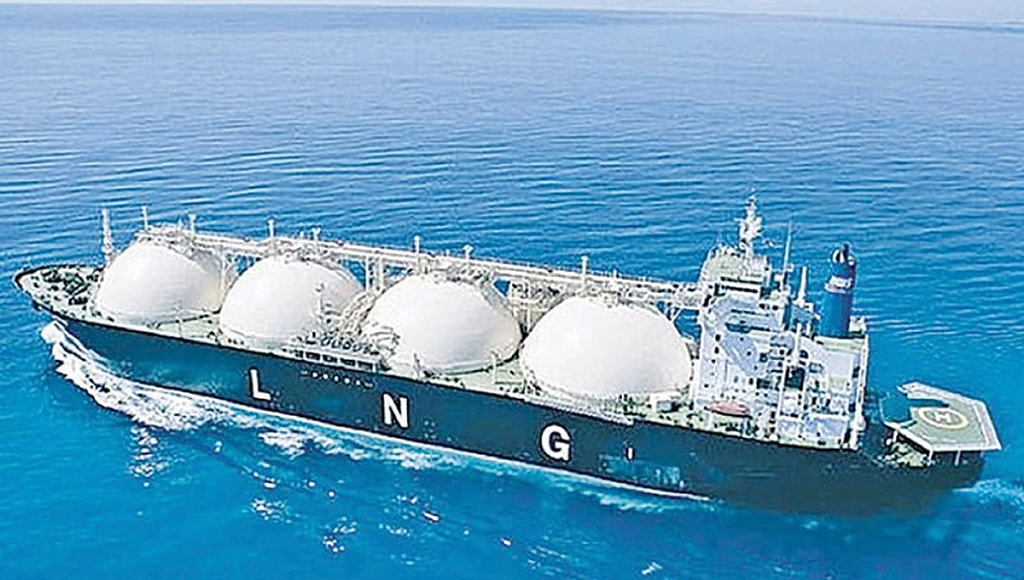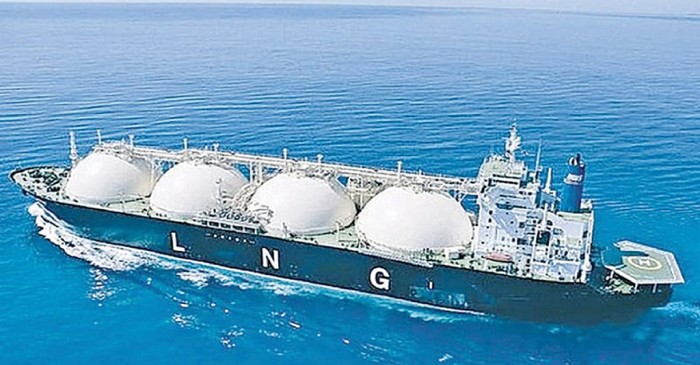
A file photo shows a vessel carrying LNG. | New Age photo
Bangladesh has posted high growth in importing liquefied natural gas among the South Asian countries in the current calendar year, exposing the vulnerability of the country’s energy security.
Energy experts said that the high growth in the LNG import especially from the volatile spot market had continued under the interim government over the past 15 months in the absence of major efforts to diversify sources like renewable energy.
On November 18, the advisory council committee on government purchase approved a proposal to import 49th cargo of LNG from the spot market in the current calendar year. The country had imported 30 cargoes of LNG in 2024.
India and Pakistan, two other countries in South Asia importing LNG like Bangladesh, have checked their imports of LNG in the current calendar year.
Media reports from India said that the annual LNG demand was set to contract in 2025 for the first time in years as the world’s fourth-biggest LNG importer bought about 16 million tonnes of LNG in the eight months through August, down 10 per cent from a year earlier.
Pakistan has recently cancelled 21 LNG cargoes under their long-term supply contract on the back of domestic gas surplus for the first time in years, underscoring a significant shift in its energy landscape, where rising renewable power generation has upended earlier import forecasts.
Referring to the past two years’ success of rooftop solar power that accounts for a quarter of Pakistan’s electricity supply, Shamsul Alam, energy adviser of the Consumers Association of Bangladesh, said that Bangladesh could easily increase power generation from rooftop solar and reduce dependency on gas-fired power plants.
The renewable energy production in Bangladesh remained very limited, making up only about 2.90 per cent of its total electricity generation with solar power the primary source with an output of about 1,000 megawatts at the end 2024.
Despite having potential of generating 3,000 megawatts of electricity from rooftops alone in addition to wind and hydro power opportunities in coastal areas, Bangladesh has to rely on import for its 85 per cent of its energy supply.
Shamsul lamented that the interim government had failed to bring about major changes to the flawed structure built by the ousted authoritarian Awami League regime to benefit vested quarters.
The AL regime began the gas import in 2019 under long-term purchase deals on the back of the falling production from the domestic wells to about 2,049mmcfd (million cubic feet per day) in 2024 from 2,443mmcfd in 2020.
Since September 2020, state-owned Petrobangla has been importing LNG from the spot market that provides short-term flexibility but comes at a much higher cost per cargo and greater energy risk.
Over-reliance on spot purchases without expanding domestic gas production or diversifying energy sources had caused problems in 2022 for the Awami League regime which was ousted in August 2024 in the wake of a mass uprising.
Between July 2022 and February 2023, Petrobangla had to suspend the LNG imports from the spot market because of the price hikes of the item on the global market following the Russian-Ukraine war.
In 2023, Petrobangla imported 23 LNG cargoes from the spot market.
The World Energy Outlook 2025 released on November 12 by the International Energy Agency projected that Bangladesh’s LNG demand would rise significantly, potentially making it the second-largest importing country in South Asia by 2035.
This increase will come to fill the energy gap in sectors like the power generation and industry because of the falling domestic gas production at the rate of about 15 per cent over the past year ending in 2024.
The potential of the domestic gas production has remained unexplored, said Badrul Imam, an honorary professor of geology at Dhaka University.
Noting that there was a lack of serious efforts for domestic gas exploration by the successive governments, he said that energy policymakers were more focused on imports.
Even a substantial part of the Gas Development Fund, established in Bangladesh in 2009 to finance the exploration and development of the country’s gas sector, was spent on the LNG import in 2023 when the government was facing a shortage of fund.
Available data show that the country spent an estimated Tk 40,752 crore on the LNG imports in the 2024-25 financial year, pushing up the overall tally to more than Tk 2,00,000 crore since FY 2008-09.
